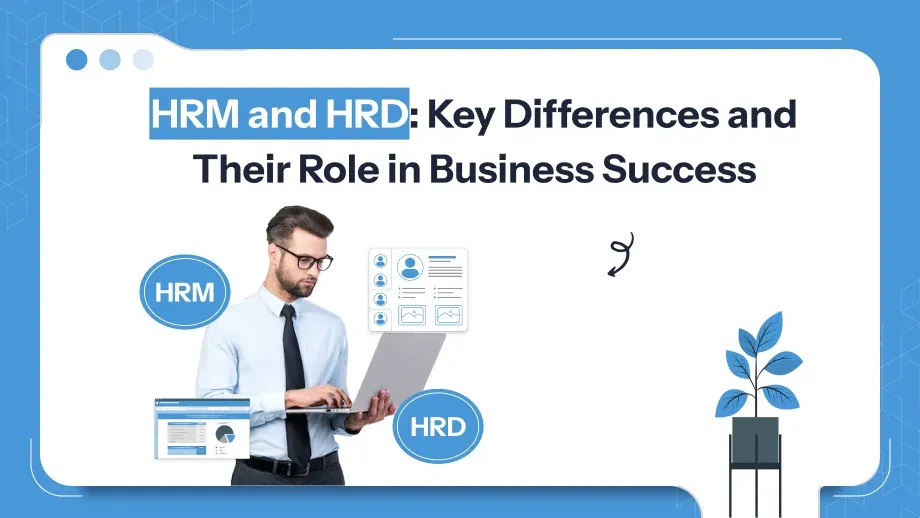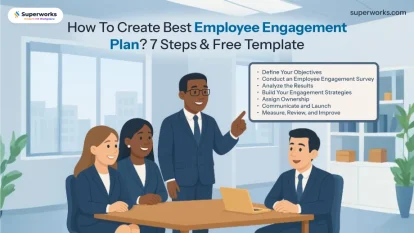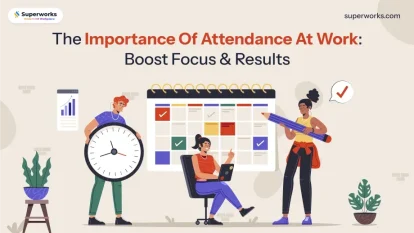
Human resources form the backbone of any organization, and within that framework, Human Resource Management and Human Resource Development are two necessary parts. These two aspects have some overlap in terms of definition but function quite differently in an organization. The blog below compares and contrasts the roles played by HRM and HRD. We will discuss what they bring to a business, and how their pair can help grow the business.
What is HRM (Human Resource Management)?
Human resource management (HRM) is the approach that is strategic to the people of an organization. It involves recruiting, management and ensuring that employees are working efficiently to achieve the goals of the organization.
Key Functions of HRM:
- The process of recruitment and selection: Attracting people with the appropriate skills to fill the appropriate positions.
- Pay and benefits: Creating pay structures and benefits that offer in line with the competition.
- Performance Management: Keeping track of the employees’ performance in order to ensure that they are aligned with the organizational goals.
- Employee Relations: Resolution of Conflict and fostering a positive work setting.
- Compliance at Work: Follow-up with workplace policies and laws.
- Training Administration: Providing essential skill upgrades for immediate job requirements.
Core Objectives of HRM:
- Future Workforce Planning: Forecasting requirements for workforce to be in line with the business goals.
- Employee Engagement: Building an environment that encourages enthusiasm, dedication and fulfillment.
- Compliance Management: Ensuring adherence to work safety rules, as well as corporate policy.
- Performance Optimization: Streamlining the process for increased efficiency and productivity.
HRM in the Digital Age
In fact, technology has dramatically transformed the HRM process. In the transition to HRMS programs to AI-based recruiting software, the digital revolution has transformed HRM processes more effectively and driven by data. Cloud-based tools allow HR personnel to track employee information as well as performance evaluations and also compliance easily with simplified procedures and improved making decisions.
HRM outsourcing tasks on an operational level handling day-today operations as well as workforce efficiency. The company is focused more on the short-term, such as the hiring of staff and conformity.
What is HRD (Human Resource Development)?
Human Resource Development (HRD) is part of HRM but it’s focused on long-term employees’ development and growth. It focuses on building the knowledge, skills and abilities of workers to face any future challenges.
Core Components of HRD:
- Training and Development: Providing job-specific skills and competencies development programs.
- Career Planning: Assisting employees in mapping their career in the organization.
- Organizational Development: Strategies for improving overall effectiveness of the organization.
- Learning Programs for Students: Seminars, workshops, and online learning for continual learning.
The scope of Human Resource Development is not limited to immediate job roles but also focuses on developing leaders and innovators for the future.
Strategic Importance of HRD:
HRD is one of the most important factors to build the ability of a workforce that is flexible and strong. In focusing on the growth of their staff, businesses are able to:
- Enhance productivity and efficiency.
- Foster employee engagement and satisfaction.
- Reduce turnover and improve retention.
The Evolution of HRD
This evolution of HRD underscores how much importance has come to be attached to this function in modern businesses. From the early days of basic training, HRD has progressed into leadership development, succession planning, and an innovative work culture. Today, for sure, it is a critical element that would enhance competitive advantage through human capital.
Read More: Global Human Resource Management: What Is It? How Does It Work?
Key Differences Between HRM and HRD
The difference between HRM and HRD to appreciate these roles, understanding what delineates:
| Aspect |
HRM |
HRD |
| Focus |
Operational (day-to-day activities) |
Developmental (long-term growth) |
| Scope |
Broad, covering all HR functions |
Narrow, focused on employee development |
| Approach |
Reactive (responding to immediate needs) |
Proactive (planning for the future) |
| Objective |
Ensuring efficient workforce management |
Enhancing employee potential |
| Tools and Techniques |
Recruitment, performance appraisals |
Training programs, career planning |
Although HRM concentrates on the efficient management of the workforce, HRD aims to develop and enhance the capabilities of employees in aid of the organizational objectives.
Interrelation Between HRM and HRD
HRM along with HRD are both interdependent and complement each other. HRM is the basis to HRD by directing daily activities. HRD provides depth to HRM by making sure the employees are prepared to face the future.
How HRM Supports HRD:
1. Providing the Foundation:
- HRM will make sure the right people are in the right place, which is the foundation for HRD in HRM.
2. Resource Allocation:
3. Identifying Training Needs:
- Through performance appraisals and workforce analytics, HRM identifies skill gaps that HRD can address.
How HRD Enhances HRM:
1. Improving Workforce Capabilities:
- HRD enhances the skillsets of employees, making HRM’s job of managing the workforce more efficient.
2. Leadership Development:
- HRD prepares employees for leadership roles, ensuring smooth succession planning within HRM frameworks.
3. Fostering a Learning Culture:
- HRD creates an environment of continuous improvement that supports HRM’s objectives.
A well-integrated approach to evolution of HRM and HRD enhances organizational performance by ensuring operational efficiency and fostering innovation.
Enhance HRM and HRD with User-Friendly Automation!
Boost workforce efficiency with tailored, tech-driven development plans.
Goals of Human Resource Development
The goals of human resource development include:
- Improving Employee Skills and Knowledge: The ability to be better at what one does is made possible.
- Employee Engagement: Help your employee feel appreciated and valuable.
- Leadership Development: The growth of leaders within the company.
- Support Organizational Change: Preparing the employee for the changes in the business strategies or technologies.
- Inspire Innovation: Create an army of workers who can lead the development of innovative ideas.
The goals are aligned with the vision for creating a flexible and resilient organization.
Advantages of HRM and HRD to Organizations
Advantages of HRM:
- Operational Efficiency: Streamlined recruitment, payroll, and compliance processes.
- Customer Satisfaction: Fair and fair rules and incentives that increase morale.
- The Conflict Resolution Methodology: A planned method for resolving workplace conflicts.
Advantages of HRD:
- Talent Development: Employees gain skills to meet emerging challenges.
- Organizational Adaptability: Teams are better prepared for industry changes.
- Retention and Loyalty: Continuous development opportunities reduce turnover rates.
As a team, HRM and HRD are making a total HR plan to maximize the potential of the employees.
HRM and HRD Trends in 2025
The future of HR is based on methods and technologies.
AI and Automation:
Automation and AI make the process within HR simpler, ranging including automated repetitive tasks, choosing the most effective options.
- HR and Recruitment: A machine-learning tool is used for interview scheduling, screening resumes and also predicting the fixability of candidates.
- Performance Analysis: Automation allows the real-time monitoring and analysis of measures of employee performance.
- Learning Platforms: AI customizes training programs based on individual learning patterns and career goals.
Data-Driven HR:
The HR Analytics is now the foundation of both HRM and HRD plans.
- Workforce Planning: Data-driven insights allow for forecasting future requirements for staffing and the finding gaps in skills.
- Employee Retention: Predictive Analytics determine employees at risk and recommend effective retention strategies.
- Training Effectiveness: Analytics evaluate the ROI of training programs and suggest improvements.
Focus on Employee Experience:
In 2025, the experience of employees is expected to remain an important concern in HR development teams.
- Wellness Programs: Businesses are investing in mental wellness opportunities and resources, as well as flexible working options.
- Personalization: Tailored career development plans and benefits enhance satisfaction.
- Engagement Tools: Surveys, feedback platforms, and recognition programs keep employees motivated.
Remote Work Solutions:
The HR practice has changed since the transition to remote and hybrid models of work.
- Virtual Onboarding: Easy process of onboarding ensures that employees are able to integrate seamlessly in a seamless manner, even when they are located far away.
- Communication Tools for Collaboration: Slack and Zoom are among the many platforms designed to help teamwork and communication.
- Remote Training: functions of human resource development utilizes e-learning platforms to deliver engaging training programs.
Integration of HRMS Software:
The HRMS system is a complete solution that streamlines HR tasks which makes them more efficient and flexible.
- Centralized Data: HRMS software consolidates employees’ data to make it easier for administration.
- Process Automation: Automating payroll, attendance tracking, and compliance reduces administrative burden.
- Custom Solutions: Cloud-based HRMS platforms can create custom modules to meet specific needs of an organization.
Based on these developments, companies are able to improve their HRM and HRD initiatives to remain on top of their game in 2025 and beyond.
Conclusion
HRM and HRD are the two different sides of a piece of the puzzle for an organization. HRM assures a smooth operation of daily activities, whereas HRD helps employees prepare for the new challenges in the future. The business can develop a resilient and flexible workforce through realizing the advantages of each. In India, implementing HRMS payroll software in India can further improve the processes of the management of payroll, automating administrative processes, and assisting employees with growth initiatives. Insight into HRM, HRD and modern HRMS systems isn’t simply a way to make money and a matter of necessity to sustain growth and keep up with the latest innovations.









